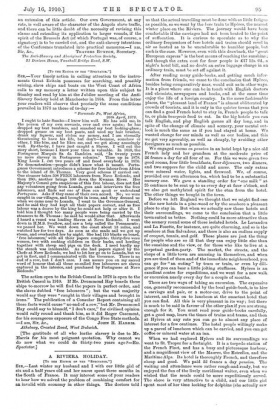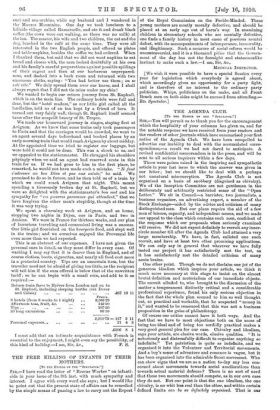A RIVIERA HOLIDAY.
[TO THE EDITOR OP THE "SPECTATOR."]
SIR,—Last winter my husband and I with our little girl of six and a half years old and her nurse spent three months in the South of France. It may interest some of your readers to hear how we solved the problem of combining comfort for au invalid with economy in other things. The doctors told
us that the actual travelling must be done with as little fatigue as possible, so we went by the luxe train to Hyeres, the nearest winter place on the Riviera. The journey would have been comfortable if the carriages had not been heated to the point of suffocation. It is carious to speculate as to why the ordinary frequenters of luxe hotels and trains should revel in air so heated as to be unendurable to humbler people, but such is the case. However, even with this drawback, the "great European express" is the best means of reaching the sunshine ; and though the extra cost for four people is £17 12s. 6d., a night's hotel bill, and no doubt an extra luggage charge in an ordinary train, must be set off against it.
After reading many guide-books, and getting much infor- mation from friends, we came to the conclusion that Hyeres, besides being comparatively near, would suit us in other ways. It is a place where one can be in touch with English doctors and chemists, newspapers and books, and at the same time enjoy the life of a foreign country. In the more fashionable places, the "pleasant land of France " is almost obliterated by crowds of tourists, and it is only in the quieter towns that you can find a good French hotel to stay in, French people to talk to, or plain bourgeois food to eat. In the big hotels you can talk English, and play English games all day long, and in spite of the change of climate and scenery, your mental out- look is much the same as if you had stayed at home. We wanted change for our minds as well as our bodies, and this we got very agreeably, as well as cheaply, by avoiding other foreigners as much as possible.
We engaged rooms en pension in an hotel kept by a nice old French lady and her grandson at the moderate price of 26 francs a day for all four of us. For this we were given two good rooms, four little breakfasts, four dejeuners, two dinners, and two suppers for the child and nurse. The only extras were mineral water, lights, and firewood. We, of course, provided our own afternoon tea, which had to be a substantial nursery one. We gave a standing order for "one milk " at 25 centimes to be sent up to us every day at four o'clock, and we also got methylated spirit for the etna from the hotel. The other things we bought in the town.
Before we left England we thought that we might find one of the new hotels in a pine-wood or by the seashore a pleasant place to stay in. But when we actually saw these hotels and their surroundings, we came to the conclusion that a little town suited us better. Nothing could be more attractive than the scenery round some of these isolated hotels. Le Lavandon and La Fosette, for instance, are quite charming, and so is the seashore at San Salvadour, and there is also an endless supply of croquet, tennis, and golf. These places are just the thing for people who are so ill that they can enjoy little else than the sunshine and the view, or for those who like to live at a perpetual garden-party. The market, the streets, and the shops of a little town are amusing in themselves, and when you are tired of them and of the immediate neighbourhood, you can go for " an outing" by tram or train, or even by dili- gence if you can bear a little jolting stuffiness. Hyeres is an excellent centre for expeditions, and we went for a new walk or excursion nearly every day for a couple of months.
There are two ways of taking an excursion. The expensive one, generally recommended by the local guide-book, is to hire a carriage and pair, or a motor-car, drive to the point of interest, and then on to luncheon at the smartest hotel that you can find. All this is very pleasant in its way ; but there is much to be said in favour of the other plan if you are strong enough for it. You must read your guide-books carefully, get a good map, learn the times of trains and trams, and then at Hyeres at any rate you can go to almost any place of interest for a few centimes. The hotel people willingly make up a parcel of luncheon which can be carried, and you can get coffee or mineral water at an inn.
When we had explored Hyeres and its surroundings we went to St. Tropez for a fortnight. It is a torpedo station of the French Fleet, and has a busy and picturesque harbour, and a magnificent view of the Hawes, the Estrelles, and the Maritime Alps. Its hotel is thoroughly French, and therefore cheap and good. We paid 22 francs a day pension. The waiting and attendance were rather rough-and-ready, but we enjoyed the fun of the lively meridional waiter, even when we wished that the meals could be more expeditiously served. The shore is very attractive to a child, and our little girl spent most of her time looking for dolphins (she actually saw one) and sea-urchins, while my husband and I wandered in the Manres Mountains. One day we took luncheon to a hillside village called Ramatuelle, and ate it and drank black coffee (the cows were out walking, so there was no milk) at the inn. The master, his wife and two children, the cat and the dog, lunched in the cafe at the same time. They were all interested in the two English people, and offered us plates and table-napkins, besides the coffee we had ordered. When I thanked them, but said that we did not want napkins to eat bread and cheese with, the man looked doubtfully at his own and his family's careful preparations against possible spillings of their ragout and then at our barbarous unprepared- ness, and dashed into a back room and returned with two enormous cloths, saying : "You had better use them ; on se sail rite." We duly spread them over our knees, and I shall always regret that I did not tie mine under my chin!
We wanted to begin our return journey from St. Raphael, which is on the main line. The ordinary hotels were full and dear, but the " hotel madam," as our little girl called all the landladies, told us of an inn kept by a friend of hers. It turned out very fairly well, though St. Raphael itself seemed tame after the unspoilt beauty of St. Tropez.
We made our homeward journey in stages, staying first at Avignon. As we knew that some trains only took passengers to Paris and that the carriages would be crowded, we went to an agent several days beforehand and booked places by an early morning train that would reach Avignon by about midday. At the appointed time we tried to register our luggage, but were told it could not be done. This was a shock to us, and we appealed to the stationmaster. He shrugged his shoulders pityingly when we said an agent had reserved seats in this train for us. If we had gone to him in the first place, he remarked, he would not have made such a mistake. "B faut s'adresser an bon Dieu et pas aux saints," he said. We promised to do so in future, and he then told us of a train by which we could reach Avignon that night. This meant spending a tiresomely broken day at St. Raphael, but we were so delighted with the stationmaster's bon mot and his sympathy for " ces pauvres personnes gui attendent," that we have forgiven the other man's stupidity, though at the time it was very trying.
We spent a charming week at Avignon, and so home, stopping two nights in Dijon, one in Paris, and two in Amiens. We were in France for thirteen weeks, and our plan of luxurious travelling and economical living was a success. Our little girl flourished on the bourgeois food, and slept well in the trains ; and we ourselves enjoyed the Provençal life even more than we had expected.
This is an abstract of our expenses. I have not given the personal ones in detail, as they must differ in every case. Of washing I may say that it is dearer than in England, and of coarse clothes, boots, cigarettes, and nearly all food cost more in a protected country. Tips are an uncertain item, but the traveller need not be afraid of giving too little, as the recipient will tell him if the sum offered is below that of the unwritten tariff; so he can begin with a small coin, and add to it as required :-
Return train fares to Hyeres from London and on to St. Raphael, including sleeping berths (vid Dover
and Calais) ... .C67 19 11 Francs.
8 hotels (from 8 weeks to 1 night) ... 2,583-25 Afternoon teas, fruit, fkc. 143'20 107.20
20 long excursions 86.10
2,919/5 = 117 3 11 Personal expenses... ... .. • • •• 21 4 3 £206 8 1
I must add that an intimate acquaintance with French is essential to the enjoyment, I might even say the possibility, of this kind of holiday.—I am, Sir, etc., F. S.







































 Previous page
Previous page